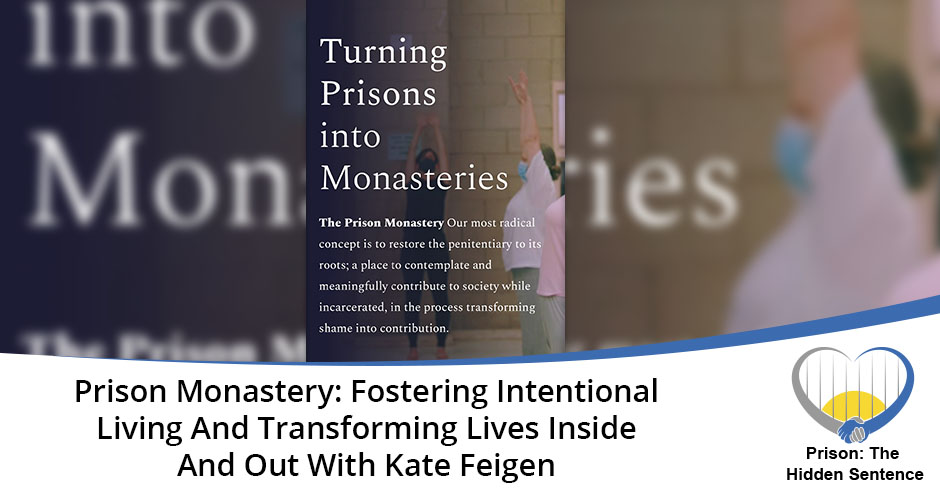
In this episode, we delve into the transformative work of Kate Feigen, a dedicated leader at the Prison Monastery, where she helps incarcerated individuals cultivate more intentional and meaningful lives. Through their program, The Art of Soulmaking, Kate and her team guide those behind bars on a journey of self-discovery, spiritual growth, and personal liberation. By fostering an environment of mindfulness and purpose, The Art of Soulmaking empowers individuals to break free from cycles of incarceration and find inner peace, regardless of their circumstances. Kate’s work not only transforms lives within prison walls but also creates a ripple effect, inspiring and healing communities on the outside. Join us as we explore Kate’s inspiring mission to bring hope, healing, and intentional living to those most in need, and the broader impact it has on society.
—
Listen to the episode here
Prison Monastery: Fostering Intentional Living And Transforming Lives Inside And Out With Kate Feigen
Introduction To Kate Feigen And Prison Monastery
I have a special guest who is changing the way we see the carceral system. I’m here with Kate Feigin of the Unconditional Freedom Organization and Director of the Prison Monastery Project. Kate is going to share her journey to help people lead better lives and create a more understanding and compassionate world through programs on contemplation, yoga, and meditation. Imagine a world where everyone is kinder, more understanding, and compassionate. How can you improve your life and the lives of your loved ones no matter where they are? This eye-opening and informative episode delves into the depths of finding liberation regardless of circumstances.
‐‐‐
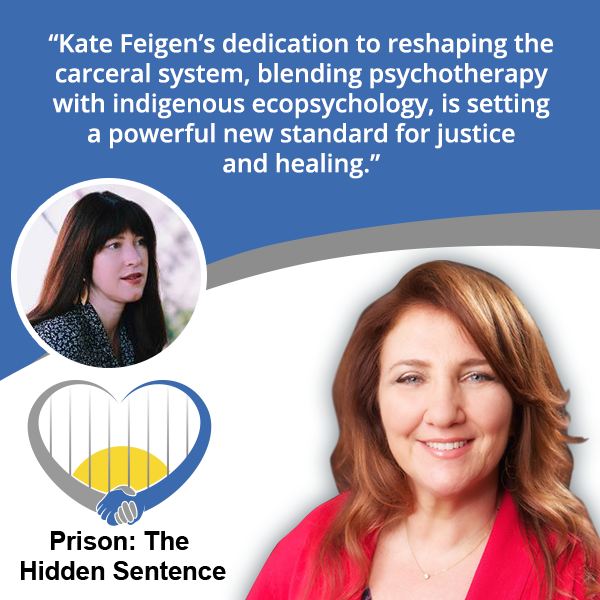
Kate, welcome, and thank you so much for being here.
Thank you so much for having me.
It’s so great to see you. We had a little discussion before. Let’s start with your organization’s goal to help people find liberation regardless of their circumstances and how the Art of Soulmaking program was a catalyst for the Prison Monastery movement.
We started looking at what liberation means and what that looks like. We noticed that there are people who are incarcerated even on the outside of prisons, and there are people who are liberated even on the inside of prisons. We started taking a look at the components of liberation and what it takes to become liberated internally. What we found is a very common theme of finding purpose, awakening your inner life, contributing, and learning how to care for others.
Liberation is possible, even within prison walls. Through self-discovery and purpose, individuals can find inner freedom regardless of their circumstances. Share on X
We put together a curriculum called the Art of Soulmaking. It is both a workbook and virtual module in the Edovo platform, which is all across prisons and jails in the United States. We started to walk people through finding liberation through contemplative practices like yoga and meditation, awakening their inner life, finding their purpose, finding the unique gifts that they have to offer the world, and learning how to shine their light outward onto others. This is something that all of us need, whether or not we are incarcerated in a facility.
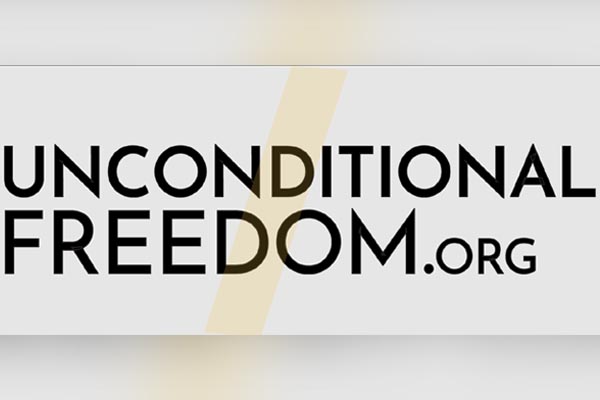
The Art of Soulmaking is beautiful in that it’s a pen pal program as well. The incarcerated residents are paired with a pen pal on the outside who is working through the modules themselves. The two of them write letters back and forth about the lessons and find liberation together, which causes the incarcerated person to feel seen and acknowledged. They feel connected to the outside world and feel an investment in the outside world and vice versa. The non-incarcerated person also feels more connected to incarcerated people and feels more connected to what happens to incarcerated people, which we believe is very important.
That was such a good explanation of everything. I wanted to clarify a few things. You said Edovo. Everybody might not be familiar with that. I have a few clarifying questions. That was one. Could you explain what Edovo is?
How The Edovo Platform Supports Incarcerated Individuals
Most prisons and jails across the United States have tablets available for their incarcerated residents. Edovo is one of the largest learning platforms on those tablets. They have contracts with almost every facility in the United States. They have thousands of courses. A lot of it is free. They’re a beautiful organization that is very committed to providing high-quality free education to incarcerated people. There are education components and academic work there, and then there are more spiritual or self-help courses. We are in that realm. People can sign on to the Art of Soulmaking, go through the modules, and get a pen pal all through the tablet, which they have right in their cell.
That answered one of my questions, and that was how people who are incarcerated find you. It sounds like they find you through the tablet. When you set them up with a pen pal, how do you find the pen pals? How would somebody become a pen pal? What is that process?
Somebody could go onto our website, UnconditionalFreedom.org, and sign up there to become a pen pal. That’s the easiest way to do it. We do a little orientation. We help people understand the prison system. We are very committed to safety in terms of protecting anonymity. It’s an anonymous correspondence. The incarcerated person doesn’t know where their pen pal lives or what their name is, but they do connect on a deep and beautiful level.
This would be open to anybody who wants to be a pen pal, whether they have somebody who is in the carceral system or maybe somebody who wants to help the community and make the world a better place. This would be open to anybody that might want to do this. To me, it sounds like it’s a safe way to do it because of the safety mechanisms that your organization has in place. As a learning, to be able to connect with somebody you don’t know and have this deep connection and learning together and also creating more compassion.
The other thing I wanted to add is that when somebody is incarcerated, sometimes they do feel alone. Sometimes they feel disconnected from society. This is a good way to stay connected. It could be family members who are staying connected but also be connected with the universe or with somebody on the outside. That is so cool. How did you get started in this?
I was always interested in working with the more marginalized people in our society. I’ve worked in the justice system itself for almost twenty years. I started out in juvenile hall, working as a drug counselor. I then got my Master’s in social work and became a therapist. I worked in the adult system for a while. I went to work at Central California Women’s Facility in the prison, and then I became a program manager at a jail in Northern California. I was running all these therapeutic programs. That’s where I met the folks at Unconditional Freedom because they wanted to do what they were calling the Prison Monastery. That’s what I was introduced to at the time. They had this idea of turning prisons into monasteries.
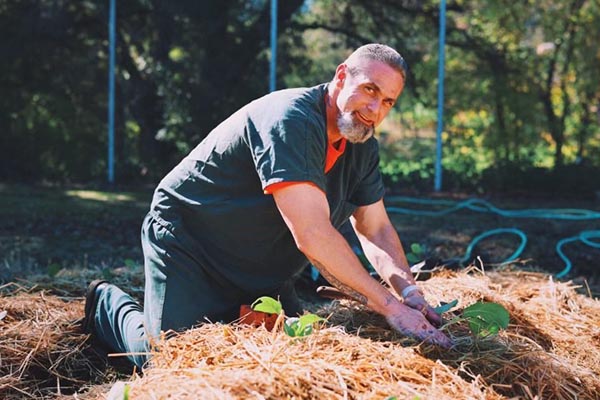
Sometimes people might think that is a strange concept because when you think of monasteries, you think of religion, monks, or nuns. For us, it is about taking away the religious piece and looking at the essential components of a monastery, which is daily rhythm, like a soothing rhythm that helps calm your nervous system, very intentional living, and contemplative practices infused throughout your day. You’re waking up all together as a community and connecting with the earth together. You’re waking up as a community and connecting with one another. Everyone has a role in the community. Everybody has something they’re contributing to the greater good.
Being folded into a rhythm like that can be soothing for somebody who has had a lot of trauma and has been surviving out there in a pretty harsh world. For most people who are incarcerated, coming into an environment that is soothing, calming, and connective where you can find your purpose and feel safe is the way that we should be providing a carceral experience rather than causing more harm, more harshness, and more chaos. It’s like a soothing antidote to what people have experienced so far in life.
Our idea is that once people leave prison, we want them to leave prison feeling more connected, feeling like they have a purpose, and feeling like society cares about them, and they have people out there who are rooting for them. That’s what the Prison Monastery does.
Returning citizens need our support and compassion as they re-enter society. Together, we can create a community where they feel they belong. Share on X
What I love about it is that it doesn’t matter what religion somebody is because it’s not religion-based. However, it doesn’t matter what faith somebody has. They can still put this into their practice. I love that. It also creates a better environment not only for the person that’s incarcerated but for the correctional officers and everybody that’s there because they’re going to have this energy that is going to be more peaceful. It could make the whole experience more peaceful.
The other thing is that when somebody’s incarcerated, they can become institutionalized and used to the structure. Having a positive structure in there coincides with the structure that they might already have. The other thing I wanted to say about that was I’m glad that you defined monastery because when I first saw that, I was like, “What does this mean?” It intrigued me. I learned more as we spoke. You explained eloquently what that means. I love the Prison Monastery. It is creating this place where people can come together in a peaceful, contemplative way and develop their own practices. That’s great.
The Prison Monastery’s Impact On Correctional Officers
You mentioned the officers. It’s important that we include them in this process because officers work twelve-hour shifts. They spend a lot of time with the incarcerated. A lot of prison programs are aimed at supporting incarcerated people, but we believe that the officers need to be an integral part of the change that we want to see.
The current justice system is dehumanizing not only to the incarcerated but to the officers too. It causes these binaries in this “us versus them” mentality even within a prison or a jail. We want to rehumanize the entire system with the officers included. They need to re-envision their own role in the system from one of punishment or one of the punitive role and harm sometimes to one of guidance, care, and dignity.
True change in the justice system starts with rehumanizing everyone involved—both incarcerated individuals and correctional officers. Share on X
We have a program within the Prison Monastery called Guards to Guardians. In there, we have a workbook. We have peer mentors who are current or retired correctional officers who guide people through this idea of transformation from this guard, this impassive, almost non-human figure, to a rehumanized version of a correctional officer who cares deeply about the community they’re working in, sees themselves as a positive influence on the incarcerated people, and sees themself as a mentor. In the Guards to Guardians program, a correctional officer begins to see themselves as a guardian and a mentor rather than this impassive figure of a guard who has lost their humanity in a lot of ways.
The prison system should be a place of transformation, not punishment. By fostering purpose and community, we can create lasting change. Share on X
It’s so important that you guys are looking at that because a lot of times, people don’t realize that it is a community. There are the correctional officers or guards who are like, “This is my role,” the person that’s incarcerated, and then there are other people involved in the prison system. It is to look at it as a holistic view that you can’t have a program on the one hand and then the other hand not know what’s going on. Let’s go back to where you started. This program started in California. Talk about how it started in California and where you are because it has grown.
From California To Nationwide: The Growth Of Prison Monastery
We started at Central California Women’s Facility in Chowchilla, California. We started during the pandemic. At that point, we were trying to figure out how to support incarcerated people. We were sewing masks because we had fabric and sewing machines. We would sew these masks and send them in. We started developing relationships with incarcerated people through writing letters, and then the Art of Soulmaking was born.
We went to the Mendocino County Jail in Northern California and then did a 2-year pilot program there on a 3-acre regenerative farm. We did daily yoga and meditation practices. We were cooking our own food and raising chickens. We had this beautiful dog running around giving love to everyone. From there, we decided we wanted to take it to the prison system, so we went back to Central California Women’s Facility and did a six-month pilot in a 170-person housing unit, one of the most violent and troubled housing units in the whole facility.
It was beautiful. We did the same thing. We started with council practice where we had peer mentors that I called culture keepers. I had 22 women who took on the ethos of the Prison Monastery and started to create their own groups. It was beautiful. We did that for six months. I decided to start working on a PhD so that we could study the Prison Monastery and all the different components of it. We started doing research on our various programs.
We’re about to launch another in-person program in Harlem, New York at Edgecombe Treatment Facility, which is a re-entry facility for folks coming out of long-term incarceration in this state. We are coming home to Harlem and creating a Prison Monastery there. We also are in 700-plus facilities across the United States as well through the Edovo tablets. We have not only people going through our Art of Soulmaking courses. We have people running their own Art of Soulmaking groups in person. We have a peer facilitator manual for folks who want to run their own Art of Soulmaking groups.
We also have an addiction program on the Edovo tablets that is getting popular. We also have a pretty large presence on death row. We have a lot of death row folks who are going through the Art of Soulmaking. We have a beautiful in-person group on death row in Alabama at Holman, which is a death row facility but they are allowed to see each other in person. It’s rare for that to happen on death row, but these guys are. They have a beautiful Art of Soulmaking group in person there. There’s a great opportunity for people regardless of their housing and status in a facility. They might be on a 23-hour lockdown and they can still participate in a piece of the Prison Monastery, which is pretty cool and exciting for us.
The whole thing is exciting, especially for the work that I do and the families that I talk to that have loved ones in the carceral system. However, I want to take a look at this and get your thoughts on something that we get asked a lot of times. We know that the families on the outside, which is where the show’s name comes from, are serving the sentence with their loved ones on the outside.
Addressing Victims’ Concerns About Rehabilitation Programs
People can relate to that because people on the outside have not been convicted of what their loved one has been convicted of. A lot of times, they’re innocent, stigmatized, and so forth. We’re always asked about the victims. When a victim hears this, they’re like, “That person did this heinous crime. Why should they be given this opportunity?” How would you answer them?
The Prison Monastery is one of the most unique models because we believe in taking accountability and responsibility for our actions. Through finding purpose, we can give back to society. We believe that that’s a big piece of this. We have a lot of opportunities for people to give back to society and figure out how they’re going to contribute in a positive way to society.
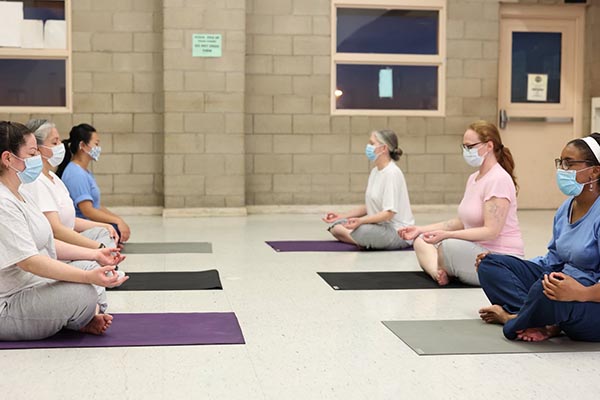
We also believe that our communities are safer when people are given the chance and the opportunity to rehumanize and return to their humanity. When we lock them up, throw away the key, and all those kinds of tropes, it tends to make people feel more isolated, less connected, and more dangerous. That’s because they don’t have those connections to society. They don’t see people as humans, and they don’t see themselves as humans. If somebody’s feeling their humanity and they’re feeling connected, they’re much less likely to hurt others when they come back out if they come back out.
This idea of hurt people hurt people or healed people heal people is an important piece of this. It’s not a reward. It’s not something that we’re giving to people and they don’t have to take responsibility for the things they’ve done. It’s creating the conditions for people to take a good look at themselves, take a good look inward, and understand the gravity of what happens when you hurt other people. If you’re in survival mode all the time, defending yourself, and being harmed, you are not going to have the capacity to take a look at that kind of thing. We want to create the conditions for people to do that inner work.
That makes me think of so much when this comes up because people who are incarcerated, a majority of them, are going to be released and they’re coming to our communities. It’s in our best interest to have them healthier and to have them in programs. What we say in the nonprofit Prison Families Alliance where we have support meetings is that it’s what they did, not who they are. You’re getting to the root of who they are.
It also makes me think of the Butterfly Effect where there’s a butterfly on the other side of the world flapping its wings and that can cause tsunamis or something in another part of the world. We are all connected that the people who have been convicted of crimes can be better and be more in touch with themselves, more in touch with the earth, and more in touch with the community. It makes it better for all of us. That made me think of a whole lot. You guys do so much. Let’s touch on this quickly. You also have some food programs that you do outside of this.
Free Food Program: Nourishment With Dignity
We have another program in our nonprofit called Free Food. We’re in the San Francisco area, the Bay Area, and then in Harlem, New York. We partner with local restaurants and farms. We divert food that is going to go to waste and repurpose it into not only a nourishing and healthy meal but a very thoughtfully prepared, beautiful meal. We create this sit-down restaurant experience with cloth napkins and a lovely glass of sparkling water. It’s a free meal for anyone hungry. They can come in and feel that dignity of being served, being loved, and being fed a nourishing and thoughtfully prepared meal. We do that in Harlem and the Bay Area.
A lot of formerly incarcerated people come, and when they come, they want to get involved. Oftentimes, they become servers or they volunteer in the kitchen. We have a ton of folks who have been on the other side of the dehumanizing system who get to restore their own humanity through serving others and building community together. That’s a beautiful thing that we get to do. We’ll be bringing some of these beautiful Free Food meals into the Edgecombe facility in Harlem when we’re doing our work starting this summer of 2024. They all feed into one another, this system that we’re creating.
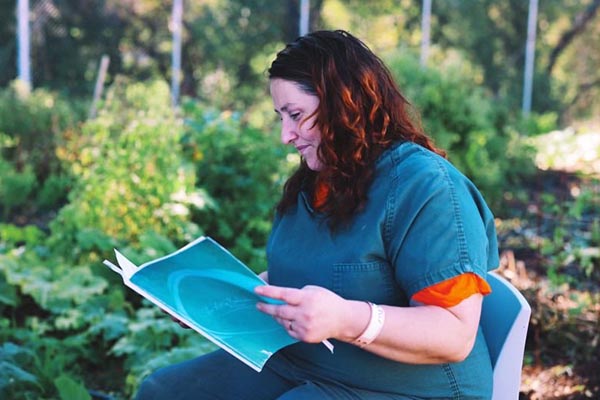
I always say giving and receiving are the same. These people get the chance to receive, but then they’re also giving. When you’re giving and serving, it fills your heart. That’s so great that when people are what we call returning citizens, it even gives them a place in society. Sometimes people come out and they’re like, “Where do I fit? What do I do?” Along with everything else, they have this opportunity in these areas to do that.
The other thing I wanted to bring up is you talked about having a nice setting like a restaurant with napkins and glass. It’s not only people that are coming out of the carceral system, but we don’t realize how many people in our society don’t have that. They haven’t been to restaurants. They haven’t been waited on. It gives them an opportunity to see this and do this, and they don’t have to pay. All these programs that you’re doing, how are you funded?
Free Food Harlem or Free Food in general is funded by a lot of grants. We have a lot of grant funding. We have private donors. We have a lot of volunteers who work in the kitchen and serve. We get a free space at a church in Harlem that is gracious enough to lend us their beautiful kitchen and dining area. We have grants that cover the rest. The food as well is donated by local farms and local restaurants. We stitch it all together with that.
It’s the same for the Prison Monastery. We have some grants and private donations, but we would love to have more because we’d like to expand our offerings. The pen pal program is all volunteer-based. We have a lot of volunteers who work for the Prison Monastery as well because they believe in it and they care about it. We could always use more funding. We’re looking for fundraising opportunities as well for the Prison Monastery because we want to expand our in-person offerings as well. That’s an area that we could use support, especially for the prison programs.
We all do. All of our nonprofits are doing such good work. You hear about things going on in the world and the news and it seems like everything is doom and gloom with what’s happening in the world, and then you find out about all these wonderful organizations. No matter where you live, there are organizations in your area that are doing good work and we don’t hear about it. That’s why it’s so important to have shows like this and on social media to let people know what’s going on. We spoke a little bit earlier about what people can do to get involved. Tell us about your website. If you could tell us what you’re looking for, what can help you, and how to get in touch with you.
That’s wonderful. Thank you. You can go to our website, UnconditionalFreedom.org. We have a Prison Monastery section on the website. You can also donate. There’s a Donate button right there on the website if you want to donate. You can sign up to be a pen pal, which would be immensely helpful. You can spread the word as well, share our story, and share our website with people who might want to contribute to a project like this.
They can also share the episode.
When this episode comes out, share it on social media and share it with your friends. Promote the work that we’re doing. The right people can support it if they want to.
If you have somebody that’s incarcerated and they have an Edovo tablet, they can sign up for this. If they don’t have an Edovo tablet, then you can reach out to the local facility or the facility that your loved one is in and request when they are getting their tablets. I know here in Nevada, they’re working on getting tablets. Maybe by the time somebody tunes in to this, they will have it. We’ll see if they have Edovo on there and your program because I know there are probably lots of people out there who want their loved ones to be involved in this program.
The other thing I was thinking about is through Prison the Hidden Sentence and through the Prison Families Alliance, we support the families on the outside. I wonder if this is a possible expansion to the families on the outside. Maybe you have somebody who is incarcerated who’s going through this and growing internally, spiritually, or whatever words you want to use and they’re released. They have their family on the outside that may not have had this experience. Do you have any thoughts about that?
Having their family get involved?
Yeah.
Closing Thoughts On Compassion And Connection
It would be great if families could become pen pals. I have a brother who’s incarcerated. He’s in prison. Even if your own loved one isn’t able to participate in a program like this, it’s healing to feel like you are giving back and you are supporting incarcerated people. It’s great for families to get involved, become a pen pal, spread the word, and get involved in the ways that you can. We love to hear from formerly incarcerated people. You can write us a letter and talk about how you could get involved. You can become a pen pal. It’s powerful for currently incarcerated people to become a pen pal with a formerly incarcerated person. We’d love to hear from you if you’re formerly incarcerated.
What was the website again?
This has been so informative. I so appreciate your time. I like to usually conclude the episode, and sometimes, people think of things after, but the question I usually ask is, what you are doing in the big picture to support our families that are tuning in to the show that is in their own self-imposed prison or are serving the sentence with their loved one. Everybody has something in their life. How can we be more compassionate towards each other?
For the families who are back home and tuning in who have people on the inside who they love, it would be great to hear from you. I would love to hear from you and hear your stories. It would be great for you to become a pen pal as well. Oftentimes, people who have loved ones who are incarcerated feel very alone. Getting involved with the Prison Monastery is a very connective experience.
You might feel more deeply connected to the solutions instead of to the problems of the carceral system, which can bring a lot of hope and make us feel like we’re doing something about this daunting problem. We have monthly volunteer calls for pen pals. You can get involved there, meet other people who feel invested personally in the justice system for whatever reason, and talk to like-minded people. We’d love to have you join us.
That’s great. There are so many things and so many great organizations. There’s all the work that you’re doing. There’s the work that the Prison Families Alliance is doing. There’s a connection as we keep supporting the families on the outside, giving them a place where they can get support, and giving them a place where they can give back. There’s also the opportunity for people to share their stories on the show. We can keep raising awareness about all the good work that’s being done. Thank you so much for your time. It’s such a pleasure seeing you, meeting you, and talking to you. I know that we’re going to continue working together.
That’s wonderful. Thank you so much for having me on.
It is my pleasure.
Important Links:
- Unconditional Freedom
- The Prison Monastery Project
- Make A Donation to Unconditional Freedom Organization
- https://PrisonFamiliesAlliance.org
About Kate Feigen
 She is a licensed psychotherapist as well as working on a PhD in Community Liberation and Indigenous Ecopsychology. Kate’s research focuses and passion is on changing the carceral ecosystem for the incarcerated and the correctional officers from one of punishment to one of community, transformation and purpose
She is a licensed psychotherapist as well as working on a PhD in Community Liberation and Indigenous Ecopsychology. Kate’s research focuses and passion is on changing the carceral ecosystem for the incarcerated and the correctional officers from one of punishment to one of community, transformation and purpose

Leave a Reply